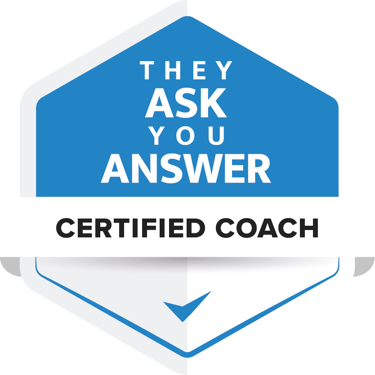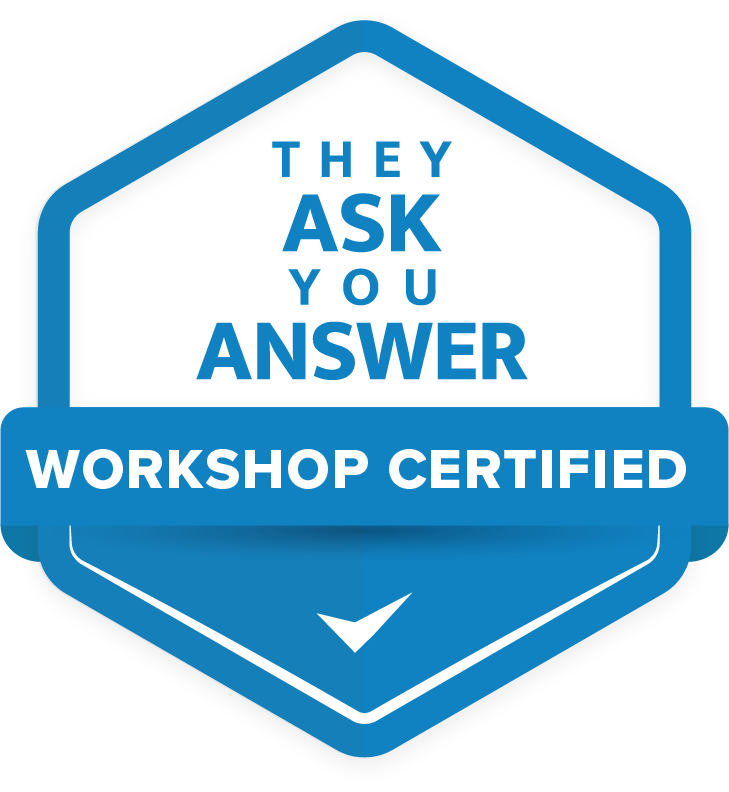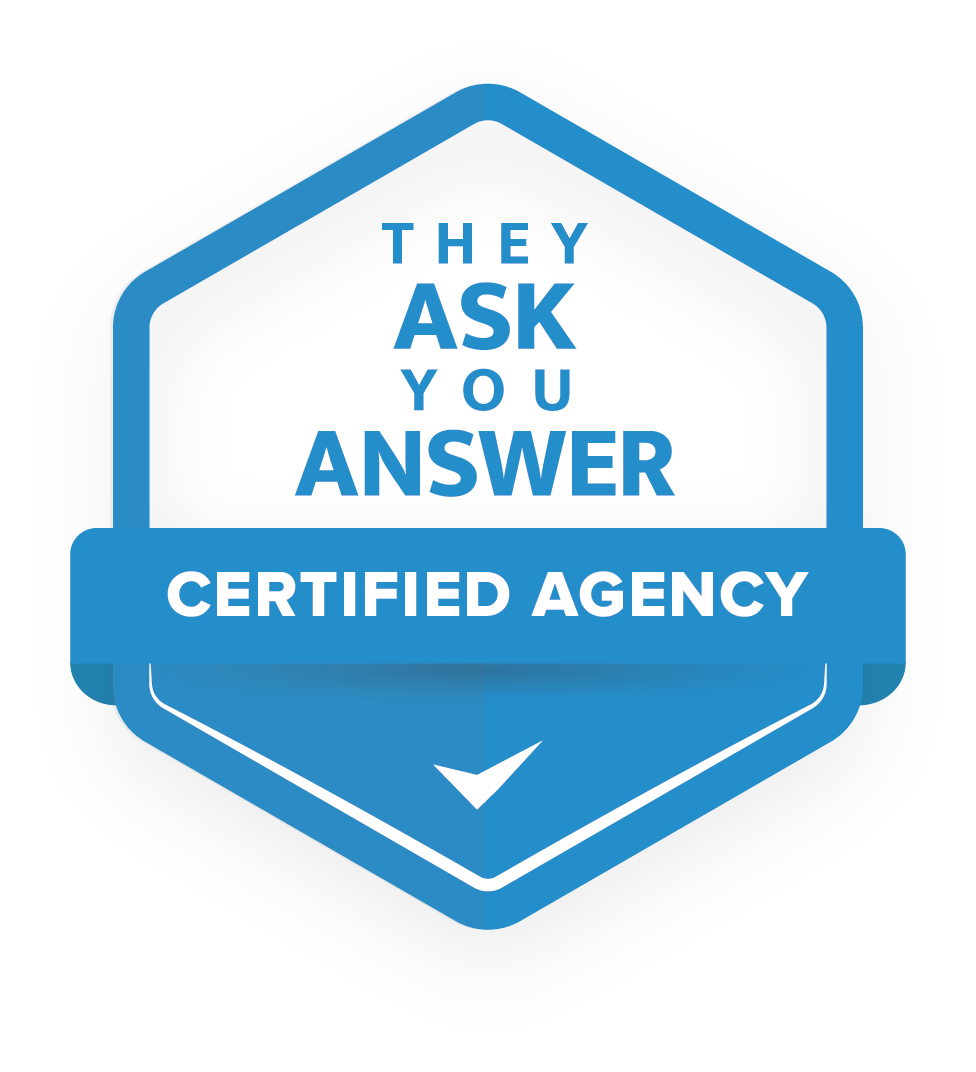Does They Ask, You Answer also work for my business?

When you first hear about They Ask, You Answer (TAYA), you may wonder if this approach is right for your business.
The successful examples you've seen are of companies with a different target audience, operating in a different industry and selling a different product or service. So you don't immediately envision how TAYA could work for your business, too.
As a head coach at Buzzlytics, I have helped many different companies implement TAYA and I see time and time again that it can work for almost any company and almost any organization, regardless of industry, target audience or company size.
Because while there may indeed be big differences between companies, there is one thing their customers have in common in the way they make a purchasing decision. And that one thing ends up being the deciding factor.
In this article, I tell you what this decisive factor is. Then I will show which types of companies TAYA is suitable for and which companies are better off taking a different approach. I also discuss the mindset needed to make TAYA a success.
After reading this article, you will know whether TAYA is an appropriate approach for your company or organization. You can then make an informed decision whether or not to go ahead with it. That way, you avoid investing time and money in something that is not a good fit for you and you can take the next step with confidence.
The factor that determines whether people buy from you
When we tell companies about They Ask, You Answer, there are always two very different reactions possible.
Some companies say, "Yes, I can see how this could work for our company."
And other companies say, "I'm sure that TAYA will work for other companies in other industries, but not for us, because we are different."
Ah, we are different.
Of course, your company is different from other companies. You have a different company name, different offerings, different corporate culture, different people employed, and so on. There are countless things that make your company different from any other company.
But think about the last time you made a big purchase. And the time before that. And the time before that.
What made you end up going with Company A and not Company B? Even though both companies had about the same thing to offer you?
The answer to that question is: trust.
You felt confident that Company A's offer was the best solution for you. And that was ultimately the deciding factor in choosing Company A.
No matter how different companies may be, this principle of trust applies everywhere.
Whether you're B2C, B2B or B2G. Whether you operate locally or internationally. And whether you sell software or provide legal advice. "We're all in the business of trust," says Marcus Sheridan, author of They Ask, You Answer.
People who trust you are more likely to buy from you. And the same goes the other way around: people who don't trust you won't buy from you. You can throw all the latest marketing tactics at them.
So we are all in "the business of trust," which is precisely why TAYA works for almost every company. In fact, at its core, TAYA is all about building trust by being radically open and transparent about the products and services you sell.
Companies TAYA works for (even if they don't think so themselves)
Local vs. international
We sometimes get the comment from skeptical clients: "TAYA is an American concept, it won't work for a Dutch company like ours." Or they turn it around and cite the very fact that they (also) work internationally as a reason that TAYA would not work. "With us in that and that market, different questions are really asked," they then say.
But if we look at customers working internationally with They Ask, You Answer, we see that Vilfredo Pareto's famous 80-20 rule holds true here as well: 80% of the questions match across markets and 20% are market-specific. This means that 4 out of 5 questions are asked in every industry. Every customer, in any industry, wants to know what your products or services cost, what their drawbacks are, what the differences are between product and y, what the best options are in a particular category, and what others think of these products.
So if you are an international operating company, there is no reason not to get started They Ask, You Answer.
And even if you are a Dutch branch of an international company, They Ask, You Answer can just work for you. You must then have the freedom to decide for yourself what you create content about and to publish and modify that content yourself.
Direct vs. indirect sales
Then you have companies that sell directly to the end user with no intermediaries vs. those that sell their products or services through intermediaries such as resellers.
Companies that do not sell directly to the end user sometimes think that TAYA is not suitable for them, when in fact we see in practice that it can work very well. After all, the content you create can also be used by the reseller to educate your end user.
One example is HubSpot. HubSpot does not sell directly to end users, but it creates content targeted to those end users. So resellers don't have to create content themselves, but can share HubSpot's content with their customers. Reseller happy, end customer happy.
Or consider a wholesaler for solar panels, home batteries and charging stations. This supplies its products to installers, who in turn sell them to consumers.
Those consumers all ask their installer tough questions about the costs and disadvantages of the products, the differences between product X and product Y, which product is most appropriate in their situation, and so on.
Chances are the installer does not have the knowledge to answer all those questions himself. You then help him greatly by creating content that can help his customers make a buying decision.
B2C/B2B/B2G
"That TAYA is nice for the consumer market," we sometimes hear. "But people in B2B and government organizations have very different information needs."
Practice shows, however, that TAYA is universally applicable. Indeed, at Buzzlytics, we have so far helped mainly B2B clients implement TAYA.
TAYA is essentially about building trust by creating content that responds to your target audience's questions and information needs. B2B and B2G customers are also just people who, like consumers, are wary of sales pitches and doubt that companies have their best interests at heart.
You can overcome this mistrust by being honest and transparent in your content. Platforms and tactics come and go, but to grow sustainably, you must build trust with your customers. We repeat: "We're all in the business of trust."
The specific interpretation may well be different for B2B and B2G than for B2C. B2B and B2G often have a longer and more complex buying process that often involves as many as 5 to 7 people. This means you need to create content for each person involved that addresses their specific questions, fears and concerns.
Regulated markets
Then we have regulated markets such as health care, legal services and financial services. These are called YMYL (Your Money or Your Life) topics because inaccurate information can have major consequences for readers. So it is extra important that the content of the articles is correct.
For companies and organizations operating in these industries, this is sometimes a reason not to venture into content marketing. The content must be of a high standard and experts often lack the time and knowledge to get started with content marketing.
Sometimes they also have the wrong idea of what kind of content they should be writing then. For example, I frequently experience professionals in these industries thinking that they should give away their advice for free in their blogs. First, they can't, because every situation is different, and second, within the TAYA framework it's all about writing content that helps their readers make the right buying decision.
Moreover, medical, legal and financial experts do not necessarily have to write their content themselves. For best results with They Ask, You Answer we recommend hiring a content manager. This person can edit the content written by the content experts, as well as write their own articles based on interviews with experts. These articles are then carefully checked by the content expert and also published under his or her name.
I myself wrote an article on laws and regulations for fire alarm systems for one of my previous employers. This was one of the best performing articles on our website because it answered the questions people had on the subject.
Also read: Should a content manager have knowledge of my industry?
Companies for which TAYA works less well
Supermarkets
They Ask, You Answer works only for companies that sell a product or service that people do extensive research on before making a purchase.
So for products that people purchase without thinking, it is less suitable. Consider, for example, a tube of toothpaste or other typical supermarket products.
(Semi-)government organizations that do not need to do sales
Furthermore, there are (semi-)government organizations that do not need to do sales. In those cases, it does not make sense to work with They Ask, You Answer because it is a completely sales-driven approach. For an elementary school, for example, it would not be an appropriate approach.
This does not mean that TAYA is necessarily not suitable for (semi-)government organizations, as there are also government organizations of a more commercial nature for which it can work.
Nonprofit organizations
Finally, They Ask, You Answer does not fit non-profits as well. People donating to non-profits do not do the kind of research they do when making a commercial purchasing decision.
As a nonprofit, however, you can use elements from TAYA, such as being open and transparent. For example, donors often do want to know what the director of a nonprofit earns or what the organization spends its money on.
What are the characteristics of companies that are a good fit?
So They Ask, You Answer can work extremely well for most businesses and industries. The important thing is that your customers are not going to make the purchase decision overnight and that you have the right mindset to make They Ask, You Answer successful.
So what kind of mindset is that? Glad you asked, below I address it.
Willingness to be radically transparent
Radical transparency is an essential part of They Ask, You Answer. You must be willing to answer ALL of your customers' questions - even the "tough ones" - openly and honestly on your website.
A great example is Yale Appliance, which each year lists the most reliable brands they sell. Of each manufacturer, they list what their service level is: the lower the percentage, the better. This encourages manufacturers to improve their service levels, and Yale Appliance shows that the customer's interest, not the supplier's, is their number one priority.
Companies we talk to sometimes say they can't write about their suppliers' drawbacks because they don't want to offend their suppliers. But as you can see in the example, this can actually motivate suppliers to improve their products.
And perhaps more importantly, the only ones who should determine what you create content about are those who buy from you. In other words, your customers.
Willingness to put time and energy into it
Becoming a successful They Ask, You Answer company requires you to shift to a totally different corporate culture.
Marketing and sales will work together on one revenue team and will meet weekly to coordinate with each other.
Content experts should set aside time for interviews and be given space for this from management.
Your content manager often has to teach himself a different way of writing.
Sales should integrate the created content into the sales process(assignment selling) and get started with virtual selling.
These are all big changes that take time. Your team needs your support. This is where we guide you in the TAYA Mastery program.
Also read: 5 traits of successful They Ask, You Answer companies
Willingness to release budget
Finally, you must have the ability to invest in a successful implementation. They Ask, You Answer can get you a lot, but starting with it is not cheap.
First, you have to deal with costs of coaching and training.
In addition, you need to hire a full-time content manager in the first quarter, and often a videographer is hired within a year. So this means additional personnel costs for your business.
Finally, invest in tools like HubSpot, AI tools and equipment for your videographer.
Success with They Ask, You Answer hinges on the right coaching and training, the right people and the right tooling. So this is not something you want to skimp on.
Is TAYA right for my business?
They Ask, You Answer is an appropriate approach for most businesses, regardless of whether you operate locally or internationally, sell directly or indirectly and whether you operate in the B2C, B2B or B2G market. TAYA can also work well in highly regulated markets.
The main criterion for TAYA is that your customers do extensive research before making a purchase decision. So TAYA is less suitable for impulse purchases, (semi-)government organizations that do not need to make sales, and nonprofit organizations.
At Buzzlytics, we have already helped several companies in various industries successfully implement TAYA.
Are you willing to be radically transparent with your clients? Are you willing to invest time and energy in building a top TAYA team? And are you willing and able to budget for the best results?
If so, we'd love to work with you to see if our TAYA Mastery program is right for your business. Schedule an appointment with one of our They Ask, You Answer consultants today.
Related articles
March 11, 2024
-
Reading time: +/- 4 min
September 10, 2024
-
Reading time: +/- 8 min








